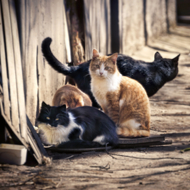iCatCare releases guidance on unowned cats and decision-making

The documents providde guidance to those working with cats on decision-making regarding unowned cats.
Cat welfare charity International Cat Care (iCatCare) has released a series of free-to-access documents to advise on cat-friendly decision-making.
The documents, focusing on decision-making in situations with unowned cats, provide accessible and practical information for those working with unowned cats who often have to make complex decisions about care.
Claire Bessant, chief executive of iCatCare, commented on the need for the documents: “Working with cats can be complex, and never more so when it is in the field of unowned cats and how to help both them and the people on this front line of cat welfare.
“Bringing together this information has taken many years - time to understand cats and the issues, time to understand people’s challenges, and time to consult and review what we know and what we don’t.
“For unowned cats, there is no doubt that good advice is scarce, hence our approach to bringing together information in as straightforward and pragmatic a way as possible.”
The first document, titled 'Managing cat populations based on an understanding of cat lifestyle and population dynamics', explains the issues that free-roaming cat populations cause and the need to humanely stabilise populations over time.
The importance of collaboration in trap-neuter-release (TNR) programmes is discussed, as well as the role that pet cat owners should play in helping organisations to achieve population reduction.
'Outcomes for kittens born to free-roaming unowned cats' discusses the gaps in knowledge surrounding long-term outcomes for kittens born to unowned cats. The document considers how those involved in care for kittens in this situation can make good decisions for the kittens' unique circumstances.
Describing cats who have been with homing organisations for a long time because their behaviour fails to appeal to potential owners, 'inbetweeners' are cats who have previously been treated as pets but struggle to live in a conventional pet setting.
In the 'Identifying solutions for inbetweener cats' document, iCatCare provides help to organisations to recognise these cats, and to develop solutions that work for their needs.
All three of the new cat-friendly decision-making documents are available to download from this link to iCatCare's website.



 The Veterinary Medicines Directorate (VMD) is inviting applications from veterinary students to attend a one-week extramural studies (EMS) placement in July 2026.
The Veterinary Medicines Directorate (VMD) is inviting applications from veterinary students to attend a one-week extramural studies (EMS) placement in July 2026.